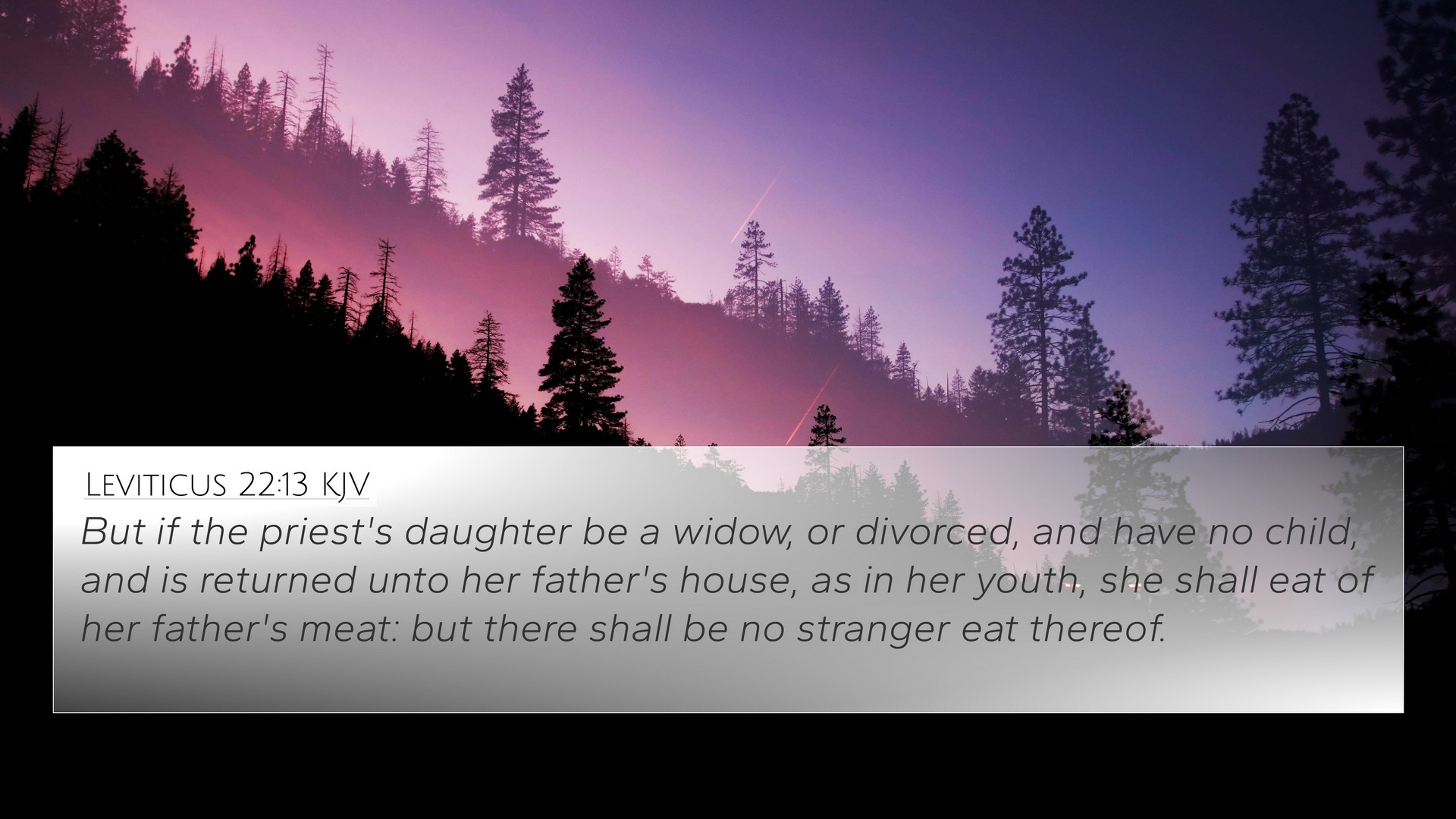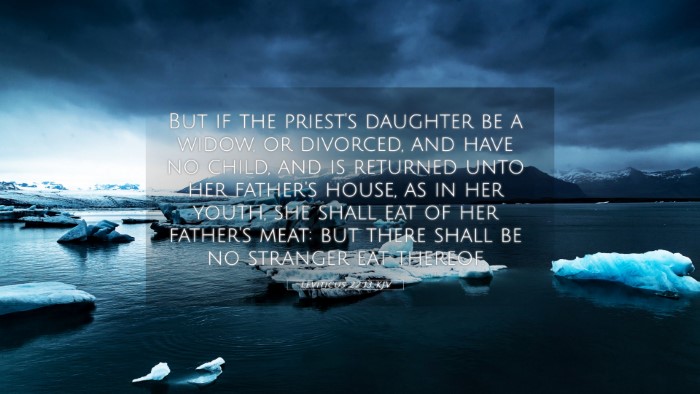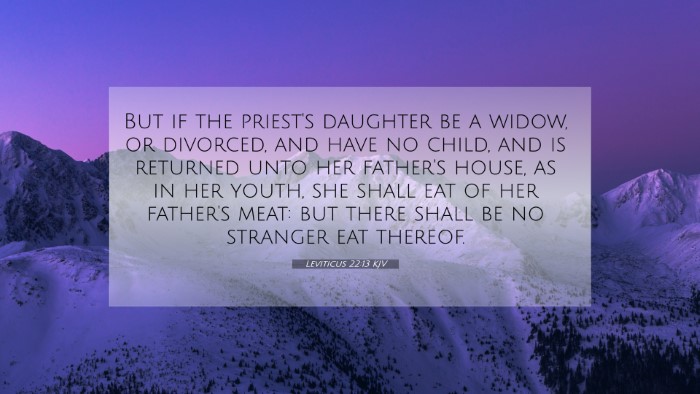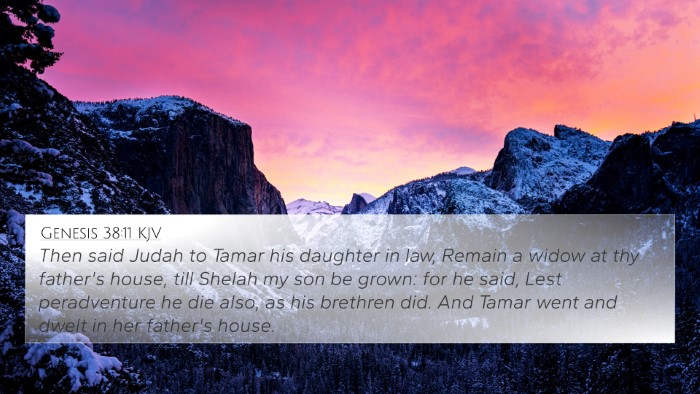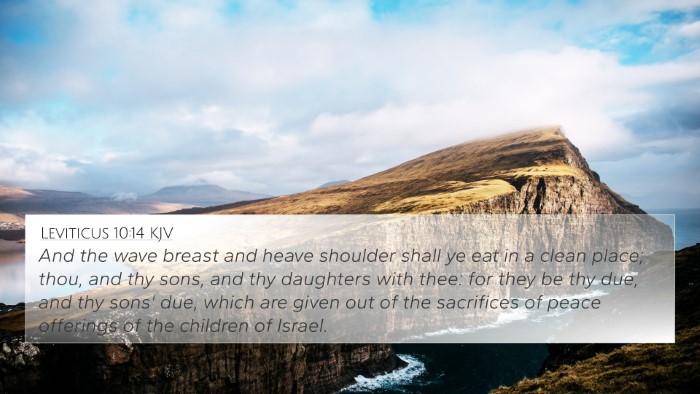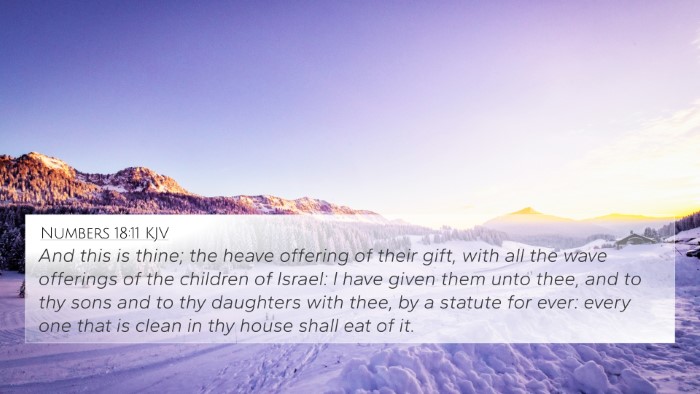Understanding Leviticus 22:13
Verse: Leviticus 22:13 - "But if the priest's daughter be a widow, or divorced, and have no child, and is returned unto her father's house, as in her youth, she shall eat of her father's meat: but there shall no stranger eat thereof."
Summary and Meaning
This verse addresses the specific dietary laws concerning the priest's daughter, highlighting her unique status within the family of a priest. The intention behind these regulations is to uphold the sanctity and holiness of offerings consumed by those serving God. Below are insights drawn from various public domain commentaries.
Matthew Henry's Commentary
Henry emphasizes that the priest's daughter, by returning to her father's house, signifies her returning to a state of purity. This restoration allows her to partake in the sacred provisions of her father's priestly offerings, representing both a physical and spiritual return. It illustrates the mercy of God in allowing the widow or divorced priest's daughter to reclaim her place and sustenance from her father's household, thus reinforcing her continued connection to the priestly lineage.
Albert Barnes' Notes
Barnes points out that this law serves to protect the priestly family's honor and maintain the distinction of those serving in sacred roles. In a broader theological context, this provision for the priest’s daughter symbolizes the ongoing relationship of grace and restoration available in God’s covenant. It speaks to the idea that those connected to God’s service are provided for, and those who find themselves outside of that covenant can still have hope for inclusion if they return.
Adam Clarke's Commentary
Clarke elaborates on the social implications of this verse. He notes that widows and divorced women often faced marginalization, but this provision illustrates a protective measure to uphold their dignity and needs. By allowing the priest's daughter to eat of her father’s meat, the verse underscores God's compassion and provision even in complex familial situations. The distinction made between her and a “stranger” serves to reinforce the sacredness of the priesthood and the standards that govern it.
Bible Cross-References
This verse connects with several other scriptures that provide insight into its meaning and implications:
- Exodus 30:20-21: Discusses the priest's duty while maintaining ritual purity.
- Leviticus 21:9: Details the consequences of a priest's daughter engaging in immorality.
- Deuteronomy 14:21: Prevents the consumption of unclean animals, emphasizing dietary laws.
- 1 Timothy 5:3-16: Discusses care for widows within the Christian community.
- Psalm 68:5: Describes God as a father to the fatherless and protector of widows.
- Galatians 3:28: Affirms the equal worth of all believers, irrespective of social status.
- Hebrews 7:12: Discusses the change in priesthood implying new provisions and access to God.
Connections Between Bible Verses
This verse interlaces with themes of grace, provision, and the sanctity of family lines in the faith community. It reflects God’s provision for those in vulnerable positions and serves as a testament to His inclusive love and justice.
Applying the Understanding
For believers seeking deeper insights, this verse encourages reflection upon the themes of remembrance within God’s family and the continuing relevance of the Old Testament laws in understanding New Testament grace.
Tools for Bible Cross-Referencing
To study the connections between such verses, tools like Bible concordances, cross-reference guides, and comprehensive Bible study resources can be invaluable. Utilizing these tools encourages a more profound understanding of scriptural themes and interconnections.
Thematic Bible Verse Connections
As we recognize the importance of this verse, it serves as a bridge to discuss broader themes in the Bible such as:
- The role of women in biblical narratives.
- The characteristics of God’s mercy and justice.
- Restoration and reconciliation within families.
- Community support for marginalized individuals.
- The ongoing relevance of Old Testament law in a New Testament context.
Bible Verse Parallels
Parallels found in the New Testament also reflect these themes, such as:
- Jesus’ interactions with widows, showcasing His compassion.
- Paul's teachings on the treatment of vulnerable members of the community.
- The overall call to holiness in living according to God's standards.
Conclusion
In summary, Leviticus 22:13 provides rich insights not only about the dietary laws pertaining to the priest’s family but also resonates with broader themes of mercy, inclusivity, and social justice prevalent throughout scripture. Understanding this verse invites us to delve deeper into our own interpretations of belonging and grace within the harmonious design of God’s kingdom.
